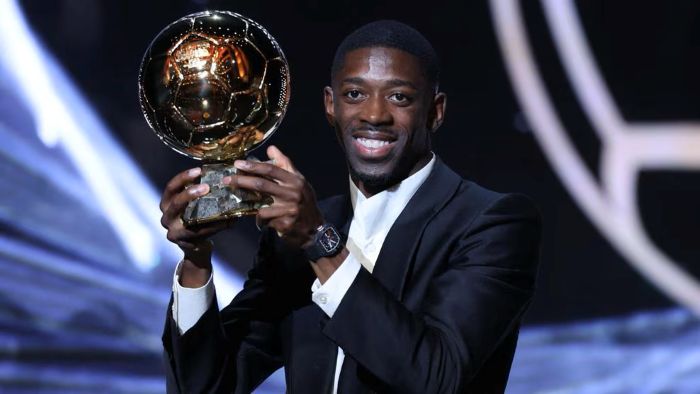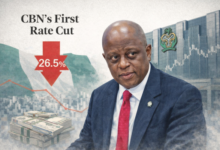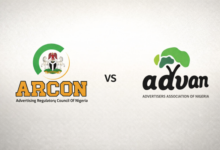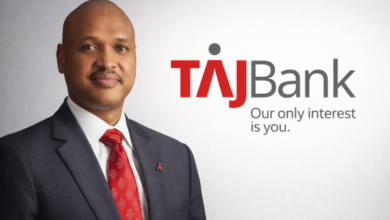Dembélé Beats Yamal to 2025 Ballon d’Or After PSG Treble Triumph

Paris Saint-Germain’s Ousmane Dembélé has finally delivered on his generational promise, winning the 2025 Ballon d’Or after a career-defining season of goals, assists, and trophies. His triumph signals more than individual brilliance—it reflects the rising commercial, cultural, and financial power of PSG, Ligue 1, and modern football’s shifting balance of influence.
A Career-Defining Night in Paris
At the Théâtre du Châtelet in Paris, history was written. The cheers were deafening, the cameras flashing, as Brazil’s Ronaldinho handed over the 2025 Ballon d’Or to a beaming Ousmane Dembélé.
Once considered a raw but inconsistent winger prone to injuries and lost opportunities, Dembélé has now cemented his place among football’s immortals. The 28-year-old PSG and France forward was crowned world football’s best after an extraordinary season that saw him:
- Fire 37 goals and 15 assists across competitions.
- Win the UEFA Champions League, where he was named Player of the Season.
- Clinch the domestic double of Ligue 1 and Coupe de France.
- Guide PSG to the FIFA Club World Cup final.
This wasn’t just another award—it was redemption. Dembélé, who left Barcelona in 2023 under a cloud of frustration and injury doubts, has reinvented himself under Luis Enrique in Paris. Now, his trophy cabinet gleams with the game’s ultimate individual honour.
Breaking Down the Triumph: A Sector-by-Sector Analysis
1. The Player: Dembélé’s Personal Reinvention
For years, Dembélé was branded as wasted potential. In 2025, he delivered the opposite. By shifting into a central attacking role, he became PSG’s most lethal weapon. His numbers—35+ goals, 16+ assists—put him ahead of younger challengers like Lamine Yamal and teammates like Vitinha.
This transformation highlights the importance of adaptability and coaching alignment. Enrique’s tactical shift turned an unpredictable winger into a structured, devastating attacker.
Investor lens: Elite performance stories like Dembélé’s translate into commercial rights growth, brand sponsorship deals, and personal endorsements. Expect his marketability and PSG’s global merchandise sales to surge.
2. The Club: Paris Saint-Germain’s Ascendancy
PSG are no longer defined by Neymar, Messi, or Mbappé. In 2025, their brand identity is tied to a homegrown European revival, anchored by Dembélé.
- Treble winners: Ligue 1, Coupe de France, UEFA Champions League.
- Ballon d’Or winner: Dembélé.
- UEFA Champions League Player of the Season: also Dembélé.
- Club of the Year (male): PSG.
This cements PSG’s transition from big-spending pretender to global powerhouse.
Investor lens: Expect PSG’s media rights, sponsorship activations, and international fan base monetisation to accelerate. The Ballon d’Or brand rub-off creates value for kit deals, streaming, and ticketing.
3. The Rivalry: Lamine Yamal and the Future of Barcelona
At just 18, Lamine Yamal was runner-up. The Kopa Trophy winner as best young player, he is the face of Barcelona’s rebuild. While Dembélé represents fulfilment at 28, Yamal embodies football’s generational transition.
Investor lens: For brands, this sets up a narrative rivalry—PSG’s established champion vs Barça’s rising prodigy. Expect marketers to exploit this in campaigns across apparel, gaming, and streaming.
4. Women’s Football: Bonmatí’s Triple Crown
While Dembélé took the men’s prize, Aitana Bonmatí claimed her third consecutive Ballon d’Or Féminin, beating Arsenal’s Mariona Caldentey and Alessia Russo.
Despite Spain’s Euro 2025 final loss to England and Barcelona’s Champions League defeat, Bonmatí’s consistency—best player at both Euro 2025 and UWCL—cements her status as the Lionel Messi of women’s football.
Investor lens: Women’s football continues to be the fastest-growing segment in sponsorship, viewership, and merchandise. Arsenal’s win as Female Club of the Year highlights the Premier League’s ability to export dominance into women’s competitions.
5. Other Awards & Recognition
- Kopa Trophy (Best Young Player): Lamine Yamal.
- Yashin Trophy (Best Goalkeeper): Vitinha’s teammate Gianluigi Donnarumma (men); Hannah Hampton (women, inaugural).
- Johan Cruyff Award (Best Coach): Luis Enrique (men); Sarina Wiegman (women).
- Gerd Müller Trophy (Top Scorer): Awarded to Erling Haaland for sheer goalscoring numbers.
- Club of the Year: PSG (male), Arsenal (female).
These secondary honours reflect broader shifts in football dominance—France, Spain, and England as epicentres of both men’s and women’s success.
What the Ballon d’Or Means Beyond Football
Commercial Impact
- Sponsorship: PSG’s Nike deal, Ligue 1 broadcasting, and French Football Federation endorsements gain higher visibility.
- Merchandise: Dembélé jerseys, limited edition Ballon d’Or memorabilia, and Champions League tie-ins will see sales spikes.
- Media Rights: Ligue 1’s global positioning improves, potentially renegotiating broadcasting contracts with better valuations.
Cultural Impact
- Dembélé’s story of injury setbacks and redemption is a global human-interest narrative—ideal for Netflix docu-series, FIFA gaming franchises, and global PR campaigns.
- His win reshapes French football’s identity, proving it can produce and sustain Ballon d’Or winners in the PSG era.
Investor Implications
- Football remains a multi-billion-dollar industry; players’ performances drive not just trophies but entire commercial ecosystems.
- Expect higher capital inflows into Ligue 1 clubs, especially around PSG’s supply chains—hospitality, betting, media, and merchandise.
- Bonmatí’s triple win reinforces the sponsorship attractiveness of women’s football, a market already growing at double-digit CAGR.
BRANDECONOMY Takeaways for Decision-Makers
- PSG are now a global commercial juggernaut. Dembélé’s Ballon d’Or caps their transition from heavy spenders to consistent winners. Decision-makers should watch for PSG-led expansion in Asia, Africa, and North America.
- Narrative marketing is shifting. The Dembélé–Yamal contrast is football’s new storyline. Brands will monetise it like Messi–Ronaldo of old.
- Women’s football is mainstream. With Bonmatí’s dominance and Arsenal’s rise, sponsors should treat women’s football as core, not niche.
- Ballon d’Or as soft power. France’s dual wins (men’s and PSG’s Club of the Year) position Ligue 1 for higher bargaining power in UEFA, FIFA, and commercial negotiations.
Risk watch: PSG’s financial sustainability under FFP, the longevity of Dembélé’s form at 28, and Barça’s ability to monetise Yamal’s rise.












